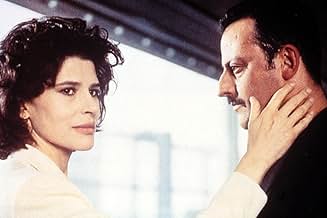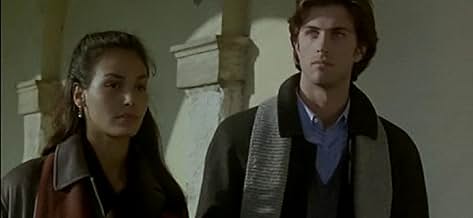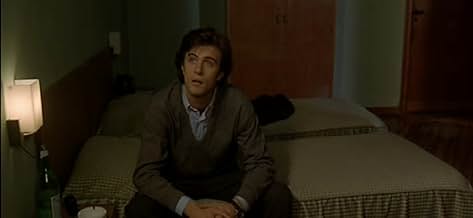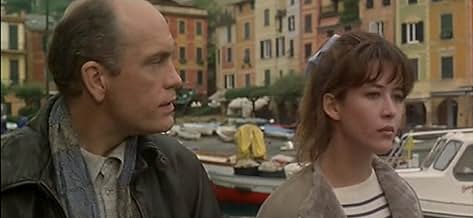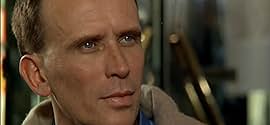IMDb रेटिंग
6.4/10
6.4 हज़ार
आपकी रेटिंग
अपनी भाषा में प्लॉट जोड़ेंFour stories about short or long relationships between men and women in Italy and France.Four stories about short or long relationships between men and women in Italy and France.Four stories about short or long relationships between men and women in Italy and France.
- पुरस्कार
- 3 जीत और कुल 6 नामांकन
Kim Rossi Stuart
- Silvano
- (as Kim Rossi-Stuart)
Inés Sastre
- Carmen
- (as Ines Sastre)
फ़ीचर्ड समीक्षाएं
A summing up of all the aging, ailing Antonioni's career themes, strengths (visual beauty, a sense of mystery and poetry) and weaknesses (pretentious stiff dialogue, ideas that are sometimes not really all that deep, a penchant for getting beautiful actresses undressed without a lot of justification).
But this is also something quite different than he's ever done, in that these are a series of short stories, loosely tied together by sequences of John Malkovich playing a director looking for his next film (Wim Wenders helped the physically limited Antonioni by directing the Malkovich sections).
By keeping the pieces smaller, I found this more fun, and more moving than most of Antonioni's films. There isn't the chance for the ideas to run as thin, and there seems to be more empathy for his characters now. Humans may be screwed up, but at least Antonioni no longer stands above them judging. One moment actually brought me near tears. The film captures the lonely enigmatic solitude of the artist, and of life itself.
But this is also something quite different than he's ever done, in that these are a series of short stories, loosely tied together by sequences of John Malkovich playing a director looking for his next film (Wim Wenders helped the physically limited Antonioni by directing the Malkovich sections).
By keeping the pieces smaller, I found this more fun, and more moving than most of Antonioni's films. There isn't the chance for the ideas to run as thin, and there seems to be more empathy for his characters now. Humans may be screwed up, but at least Antonioni no longer stands above them judging. One moment actually brought me near tears. The film captures the lonely enigmatic solitude of the artist, and of life itself.
Even though the story is light, the movie flows so beautifully and its visual so tranquil and poetic that it could almost carry the whole movie.
The film consists of four interconnected stories, all about different aspect of attraction between man and/or woman and how it frequently is ethereal. Their true desire seems to be always something that they cannot hold onto, it will flow out like a handful of sand.
I thought the most intriguing story was the last one where the more unattainable the woman was, the more the man desires her. It parallels her deep love for god, who is infinitely out of reach, but never closer to her heart.
A very good movie. 7/10
The film consists of four interconnected stories, all about different aspect of attraction between man and/or woman and how it frequently is ethereal. Their true desire seems to be always something that they cannot hold onto, it will flow out like a handful of sand.
I thought the most intriguing story was the last one where the more unattainable the woman was, the more the man desires her. It parallels her deep love for god, who is infinitely out of reach, but never closer to her heart.
A very good movie. 7/10
SPOILER: This the the final feature film that Michelangelo Antonioni directed, with the help of Wim Wenders, and adapts from his short story collection "That Bowling Alley on the Tiber". Beyond the Clouds contain 4 short stories with familiar themes that we've come to be accustomed to from his earlier works, and sums up those themes in vignettes which are weaved together via Wenders' directed scenes involving John Malkovich's The Director character. However, most of the stories seemed to offer little or no depth that we're used to from an Antonioni movie, while Malkovich's narration of supposed depth rattled on with unclear diction that sounded a tad pretentious and out of place.
Nonetheless, all four stories seem to touch on chance encounters, and extremely quick romances that played out more like lust at first sight, perhaps due to the lack of time (since they're short stories anyway) to allow for a more layered approach to carefully define and craft the characters as we know from a typical Antonioni movie. And the obsessive approach here is for the characters to disrobe to showcase a lack of deeper connection sacrificed for the immediate satisfaction of the flesh. Maybe this is the point to want to bring across with an observation of the more modern relationship?
The first story, Story of a Love Affair That Never Existed, tells the romance between Silvano (Kim Rossi Stuart) and Carmen (Ines Sastre), who meet when one asks the other for directions to a hotel, and later meet at a cafe. It's as if Fate is playing games on them when they meet, but part and meet again much later, but like the games people play, it's almost like a L'Avventura or a La Notte with the lack of communication, and of the expectations from the man.
John Malkovich's director character takes central role in the next short, who exhibited some really lecherous looks toward a girl working at a shop, played by Sophie Marceau. She is deeply disturbed and made to feel uncomfortable, but somehow plucked up the courage to approach him, and in what I thought was to scare him off, tells him her background that she murdered her father by stabbing him 12 times. But in a flash these two are off toward bedroom gymnastics.
The next short, Don't Look for Me, is the longest of the lot, with Peter Weller playing a cheating husband who has to choose between his mistress (Chiara Caselli) or his wife, played by Fanny Ardant. Perhaps the more star studded of the lot, with Jean Reno also stepping in for a coda at the end of it, which sort of expands the little universe in which this short exists. But unfortunately Reno's involvement also got relegated to some stifle of laughter as it goes into the implausible domain with laser quick romantic tanglements. There was a key element adapted from L'Eclisse with a kiss between a couple through a glass panel too, while the introductory tale about the story of souls was quite interesting. If there's a negative theme here this short wants to play upon, it'll be the duplicity of man.
In between this short and the next was a small scene which reunited our couple from La Notte, Marcello Mastroianni and Jeanne Moreau, where the former was painting a landscape which was reminiscent of that in Red Desert. Finally, we have the final shot This Body of Dirt, with Vincent Perez as a young man going after a girl (Irene Jacob) whom he just met, and falling in love with her, only to realize that it is a love that is too late. It's a relatively talkie piece, just like the first story, with the characters engaging in conversation while walking the streets of the city they're in, which sort of brings to mind Richard Linklater's Before Sunrise.
While on the whole the movie may have succeeded as individual pieces, they never quite measure up as a combined effort given the "excuse" to link them up was a film director's exploration of possible stories and a look for inspiration for his next film.
Nonetheless, all four stories seem to touch on chance encounters, and extremely quick romances that played out more like lust at first sight, perhaps due to the lack of time (since they're short stories anyway) to allow for a more layered approach to carefully define and craft the characters as we know from a typical Antonioni movie. And the obsessive approach here is for the characters to disrobe to showcase a lack of deeper connection sacrificed for the immediate satisfaction of the flesh. Maybe this is the point to want to bring across with an observation of the more modern relationship?
The first story, Story of a Love Affair That Never Existed, tells the romance between Silvano (Kim Rossi Stuart) and Carmen (Ines Sastre), who meet when one asks the other for directions to a hotel, and later meet at a cafe. It's as if Fate is playing games on them when they meet, but part and meet again much later, but like the games people play, it's almost like a L'Avventura or a La Notte with the lack of communication, and of the expectations from the man.
John Malkovich's director character takes central role in the next short, who exhibited some really lecherous looks toward a girl working at a shop, played by Sophie Marceau. She is deeply disturbed and made to feel uncomfortable, but somehow plucked up the courage to approach him, and in what I thought was to scare him off, tells him her background that she murdered her father by stabbing him 12 times. But in a flash these two are off toward bedroom gymnastics.
The next short, Don't Look for Me, is the longest of the lot, with Peter Weller playing a cheating husband who has to choose between his mistress (Chiara Caselli) or his wife, played by Fanny Ardant. Perhaps the more star studded of the lot, with Jean Reno also stepping in for a coda at the end of it, which sort of expands the little universe in which this short exists. But unfortunately Reno's involvement also got relegated to some stifle of laughter as it goes into the implausible domain with laser quick romantic tanglements. There was a key element adapted from L'Eclisse with a kiss between a couple through a glass panel too, while the introductory tale about the story of souls was quite interesting. If there's a negative theme here this short wants to play upon, it'll be the duplicity of man.
In between this short and the next was a small scene which reunited our couple from La Notte, Marcello Mastroianni and Jeanne Moreau, where the former was painting a landscape which was reminiscent of that in Red Desert. Finally, we have the final shot This Body of Dirt, with Vincent Perez as a young man going after a girl (Irene Jacob) whom he just met, and falling in love with her, only to realize that it is a love that is too late. It's a relatively talkie piece, just like the first story, with the characters engaging in conversation while walking the streets of the city they're in, which sort of brings to mind Richard Linklater's Before Sunrise.
While on the whole the movie may have succeeded as individual pieces, they never quite measure up as a combined effort given the "excuse" to link them up was a film director's exploration of possible stories and a look for inspiration for his next film.
The worst segment in this very uneven sketch film is the first, a silly tale of abandonment featuring pretty boy Kim Rossi Stuart and the Lancôme model Inés Sastre. It reeks of chic and product placement. The second episode, with a bored-looking Sophie Marceau is hardly better; we can't care if she stabbed her dad six, twelve or 528 times. Sophie does have a lovely body, however, and the boutique she works in is elegant.
The triangle story is next, with Peter Weller playing a bilingual rich man with a wife (Fanny Ardant, sensational) and a mistress (Chiara Caselli, OK). Fanny's big scene has her smashing a vase then chewing out her straying hubby. She manages to be drunk, angry and horny all at once: I have never seen her act with such power. Pity that the little sequel with Jean Reno meeting Fanny in the empty apartment isn't very effective.
The last segment with Irène Jacob, a pretty girl with a big secret, is a little gem, but it feels tacked-on, not really a part of the picture.
The triangle story is next, with Peter Weller playing a bilingual rich man with a wife (Fanny Ardant, sensational) and a mistress (Chiara Caselli, OK). Fanny's big scene has her smashing a vase then chewing out her straying hubby. She manages to be drunk, angry and horny all at once: I have never seen her act with such power. Pity that the little sequel with Jean Reno meeting Fanny in the empty apartment isn't very effective.
The last segment with Irène Jacob, a pretty girl with a big secret, is a little gem, but it feels tacked-on, not really a part of the picture.
I was stunned by this film. I have been renting Antonioni's films/rediscovering them, and this film showed me the climax and fruits of his 50 years of directing. What an eye for setting, color, and detail! I have never seen such visual beauty and poetry filmed before. I had to stop after the first story and hold back the tears. Yes, beauty moves me, like it moved Keats to write Ode on a Grecian Urn. This movie is made for the mature, emotionally and intellectually, audience. Those hoping to see physical action and soap opera will be disappointed. I will have to see this film several times before I can truly appreciate it and judge it. This film should be required viewing for all cinematographers and directors.
Possibly a truly great film, on the order of Kurosawa's Dreams.
Possibly a truly great film, on the order of Kurosawa's Dreams.
क्या आपको पता है
- ट्रिवियाIn order to obtain the covering insurance needed to put the film into production, Michelangelo Antonioni (who was still recovering from a severely debilitating stroke) had to agree to have a secondary director on staff, ready to take over from him at any time. His choice, Wim Wenders, even provided the prologue and epilogue for the film.
- इसके अलावा अन्य वर्जनThere are two slightly different versions of the movie, the difference ocurring at the end. The US version of 'Beyond The Clouds' (Al di là delle nuvole, 1995) lacks the complete voice-over narration by John Malkovich's character at the end of the movie, from the moment he enters the hotel until the last image, before going to credits. The only line heard is: 'The director's profession is very peculiar...'; whereas the European cut of the movie contains a longer narration, also starting with the same line, but expanding until the last image before fading to credits. The voice-over talks about how the director's profession is to find images, only to discover another image beneath the previous one which is more faithful to the truth, and then another, and another, until you reach the one which equals reality, the one no one will ever see. Both versions are equally powerful in their own right, though it's interesting to note such a minor difference was made in the first place. Both versions are available, the US version was released in DVD, and the European version is available in VHS only.
- कनेक्शनFeatured in Fare un film è per me vivere (1995)
- साउंडट्रैकUnknown Love
Written by Lucio Dalla and Robert Sidoli
Performed by Giuseppe D'Onghia (as Beppe Donghia) (piano) and Lucio Dalla (clarin)
टॉप पसंद
रेटिंग देने के लिए साइन-इन करें और वैयक्तिकृत सुझावों के लिए वॉचलिस्ट करें
- How long is Beyond the Clouds?Alexa द्वारा संचालित
विवरण
बॉक्स ऑफ़िस
- US और कनाडा में सकल
- $31,738
- US और कनाडा में पहले सप्ताह में कुल कमाई
- $12,596
- 5 दिस॰ 1999
- दुनिया भर में सकल
- $31,738
- चलने की अवधि
- 1 घं 50 मि(110 min)
- रंग
- ध्वनि मिश्रण
- पक्ष अनुपात
- 1.66 : 1
इस पेज में योगदान दें
किसी बदलाव का सुझाव दें या अनुपलब्ध कॉन्टेंट जोड़ें

